Dog Throwing Up Undigested Food: Causes, Symptoms, Treatment and Prevention

Seeing your furry friend vomit can be quite distressing, and it’s never a pleasant experience. Did you know that vomiting is a common issue that many dogs face?
There are various reasons why your furry friend might experience this unpleasant symptom. Undigested food is a common cause of dog vomiting. When it comes to owning a dog, it is crucial for dog owners or pet owners to have a solid understanding of the causes, diagnosis, and treatment options for dogs that throw up undigested food.
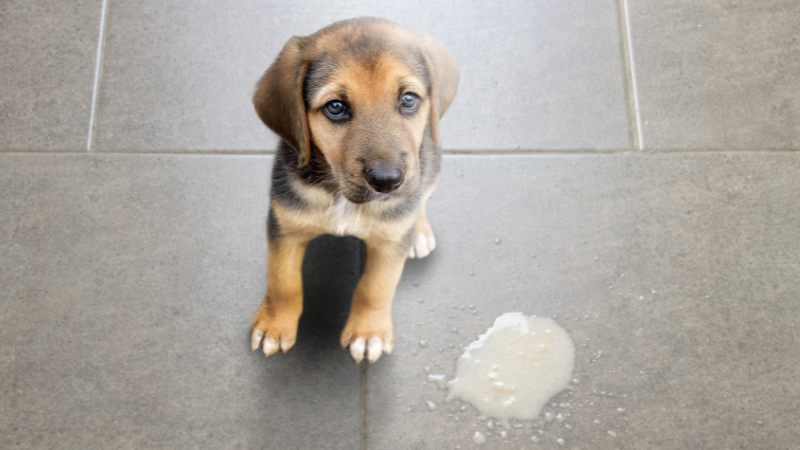
The spitting of undigested food by a dog may indicate several problems, including illness, the dog eating something that it shouldn’t have, or an imbalance in its digestive system.
Let’s discuss why your dog throwing up undigested food in detail.
Regurgitation vs Vomiting in Dogs
Before we discuss the causes of dogs throwing up undigested food, we must distinguish between vomiting and regurgitation.
The act of vomiting is an active procedure that involves the contraction of the stomach muscles, which then forces the stomach contents back up via the mouth.
On the other hand, regurgitation is an effortless procedure in which the food travels back up the esophagus without any intervention from the body.
Similarly, regurgitation is more likely to occur when a dog has an esophagus that is too thin, and a burp typically follows it.
On the other hand, vomiting is more prevalent and can be brought on by a variety of different causes that may be physiological or pathological.
Here you can find the whole mechanism of vomiting in dogs in detail
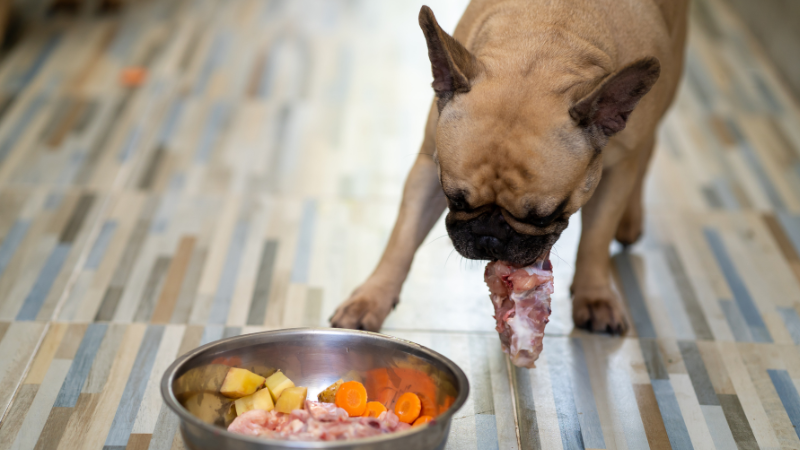
Causes of Dog Throwing Up Undigested Food
Your dog throws undigested food for several reasons, including the following:
Eating Too Rapidly (Negative Effect on Dog’s Digestive Tract)
Food that is not properly digested might be vomited by dogs that eat too quickly. When dogs eat too quickly, they end up swallowing air in addition to their food, which causes them to get bloated and vomit.
Dietary Changes
Dog can throw up food that has not been digested if they are put on a new diet or if the dog eats anything that does not mean for them. Generally, the sight of the half-eaten rotten meat made some of the dogs throw.
Conduct Food Trials
Fido’s food that is used as a food trail can also lead to vomiting sometimes. In some experiments, the esophagus pushing food/regurgitated food will become so severe that you even have to call the vet or take your pup emergency room.
Ingesting Foreign Items (Dog Regurgitates)
Dogs likely vomit fully digested food if they have consumed foreign things like toys, bones, or plants. But it is not a fact. Dog’s vomit or vomited food can also be partially digested or completely undigested. Whatever the case you must stop vomiting and try to contact your vet for the removal of foreign object ingestion.
Tip: Try to give them boiled chicken in small pieces without any bone to avoid any damage to the pet’s mouth.
Overeating or Issues with Food Digestion
Dogs who overeat are likelier to vomit food that has not been completely digested. Similarly, improper food digestion due to eating too quickly or consuming an inappropriate diet can sometimes lead to a dog throwing up.
Medical Conditions
Dogs that are suffering from medical diseases such as cancer, pancreatitis, gastrointestinal issues, liver disease, or renal disease may vomit food that has not been digested.

Diagnosis of Dog Throwing Up Undigested Food
A correct diagnosis is vital for determining the underlying reason for a dog that is vomiting or regurgitating food that it has not yet digested to devise a treatment strategy that will be successful. The following are some of the diagnostic procedures that your veterinarian may perform:
Physical Exam
A comprehensive physical examination of your dog’s body should be the first step in arriving at a diagnosis. The veterinarian will examine the patient for symptoms of dehydration, stomach discomfort, testing regurgitated food, and any other conditions that may point to an underlying disease.
Medical History
Your dog’s medical history, including any previous illnesses regarding frequent vomiting, viral infections, Addison’s disease, food allergies dogs, surgeries, inflammatory bowel disease, intestinal parasites infestation or drugs they have had, will be inquired about by your veterinarian when you take them in for an appointment.
In addition to this, they will question the nutrition and eating routines of your dog’s good gut health too.
Bloodwork
Bloodwork or blood tests can uncover any underlying medical concerns, such as kidney failure, gastrointestinal tract issues, or liver disease, and give crucial information about your dog’s overall health.
Imaging Tests
Examining your dog’s internal systems, such as the stomach and intestines, may involve the use of imaging techniques like as X-rays, ultrasound, or other imaging tests.
This can assist in the identification of any anomalies that may be related to the first vomiting episode or regurgitation that is occurring.
Endoscopy
In some severe situations, your veterinarian may suggest doing an endoscopy on your dog. This procedure entails putting a tiny camera into your dog’s mouth, esophagus, and stomach to examine the lining and see whether there are any abnormalities. In endoscopy, the dog’s esophagus dilates and the vet can see anything (especially dog food) that dog ingests.
Biopsy
In some circumstances, a biopsy may be required to identify the underlying cause of vomiting or regurgitation. This involves removing a tiny piece of tissue from the afflicted region and analyzing it further under a microscope.
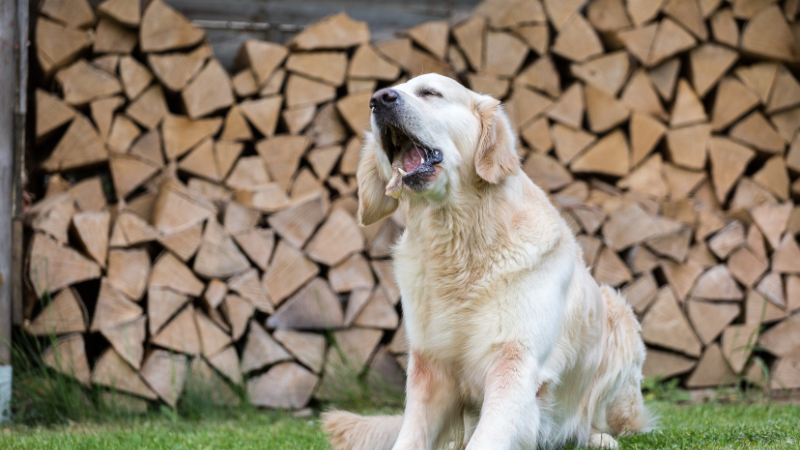
Treatment of Dog Throwing Up Undigested Food
The condition’s underlying cause will determine the treatment for dogs that vomit undigested food.
If your dog is throwing up because of a change in its food or because it has been eating too much, the veterinarian may suggest that you feed your dog smaller meals more frequently or move to a different diet.
If your dog swallowed food or objects that it shouldn’t have, the veterinarian may need to conduct surgery to extract it.
If the dog vomit results from an underlying medical issue, the veterinarian may propose or prescribe further treatment options, such as surgery or chemotherapy, in addition to the medicine.
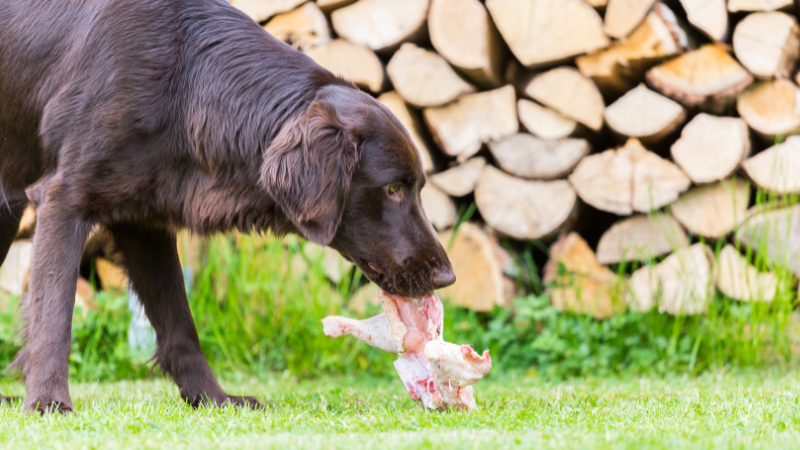
What You Can Do?
There are a few things you can do to make your dog feel better if they are throwing up food that they haven’t digested, including the following:
- Observe their signs and symptoms: Keep a close watch on the symptoms as well as the behavior of your dog. You must take them to the veterinarian as soon as possible if they continue to throw up or if they show other indications of sickness, such as listlessness, lack of appetite, or diarrhea.
- Adjust their eating habits: If you notice that your dog ate food too rapidly, consider giving them smaller meals more frequently. You might also try feeding them in smaller quantities or using a dish designed for slow feeding instead.
- Withhold food for twelve to twenty-four hours: This will give your dog’s stomach some time to calm down. It will also aid your dog’s motion sickness and abdominal pain. After this period of time has passed, you will be able to gradually reintroduce food by eating it in tiny amounts more frequently.
- Provide water: Even if they are throwing up, you must continue giving your dog water. They should be given access to fresh water and encouraged to drink it.
- Avoid giving your pet leftover meal scraps: Dogs shouldn’t eat human food since it’s often too rich or spicy for them, which might cause them to throw up or cause other digestive disorders. Continue providing them with food that is both balanced and healthful.
What Your Vet Will Do?
Your veterinarian will do a physical examination of your pet and may suggest more diagnostic testing after that. The veterinarian will also inquire about your canine companion’s nutrition, feeding routines, and medical history.
After that, your veterinarian may provide you with a pharmaceutical prescription or provide food recommendations in response to the underlying cause of the vomiting.
If your dog has swallowed an object that it shouldn’t have, the veterinarian may need to conduct surgery to extract it.
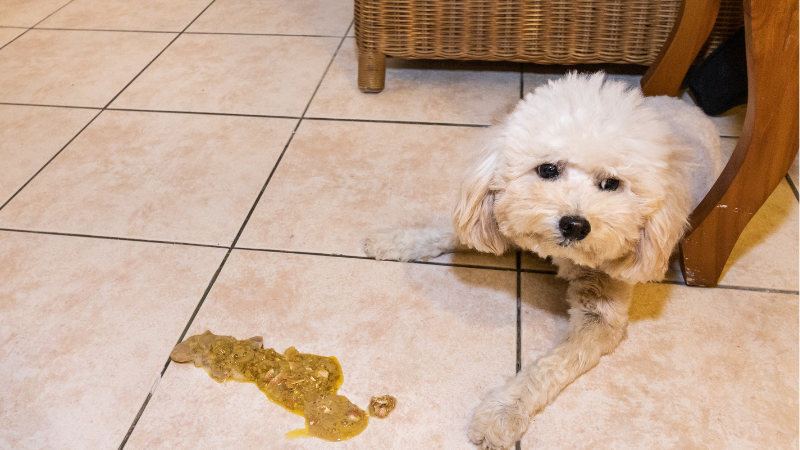
Prevention
Providing a diet that is both healthy and well-balanced is the first step in stopping a dog’s vomiting consisting of partially digested food. It is best not to give them table scraps or food intended for humans (as mentioned above), as this might cause stomach discomfort in the animal.
You need to make sure that your dog eats at a comfortable pace and that they do not overeat. A slow feeder bowl or providing them with smaller and more often foods might be helpful.
Also, ensure that your dog does not have access to potentially hazardous items such as bones, toys, or plants. Keep an eye on them while they are playing, and put potentially harmful objects out of their reach.
FAQs
How Can I Decide if My Dog Regurgitated or Vomited?
Although it may be difficult to discern the conditions when a dog regurgitates and dog vomits. However, there are several key distinctions between the two including the following:
- Vomiting is the violent expulsion of the upper intestine and stomach contents, while regurgitation is the normal expulsion of mouth, pharynx, or esophageal contents. Dog regurgitates more often as compared to vomiting.
- Vomit is partially digested food from the sensitive stomach, whereas regurgitated material is fully undigested.
- In the case of regurgitation, food has not yet reached the stomach, and the contents that are regurgitated are coming from the esophagus or the pharynx. In case of vomiting, the food is expelled from the stomach or the dog’s digestive tract.
It is recommended that you seek the advice of a veterinarian if you are unclear whether your dog is vomiting or regurgitating their food.
Fact: Unfortunately, the dog’s regurgitation of its food after each meal is becoming a cause of concern for its owner, who plans to take it to the vet for a check-up.
Here you can find all about regurgitation in domestic dogs.

How to Stop Your Dog from Regurgitating His Food at Home?
You may take a few different approaches at home to stop your dog from throwing up after eating. Some possibilities include the following:
- Trying a temporary bland diet (to reduce the frequency of dogs’ vomit food)
- Feeding smaller meals more often (to reduce the dogs’ regurgitate food ability)
- Before feeding, let the normal dog food come to room temperature.
- Feeding high-quality, nutrient-dense meals.
- Promoting a slower eating pace for your dog.
Conclusion
Eating too rapidly, dietary changes, swallowing foreign objects, overeating, food trials, food allergies, or medical issues might cause dogs to throw up undigested dog’s food.
As a dog owner, it is important that you understand the factors that contribute to this problem, as well as its diagnosis and treatment, and that you take your pet to the veterinarian immediately to receive an accurate prognosis.
It is essential to properly care for your dog’s health, by closely monitoring its symptoms and behavior, modifying its feeding routines as necessary, and providing nutritional and well-balanced food.
Your four-legged pet may remain healthy and content with your assistance if you provide them with the appropriate care all the time.
